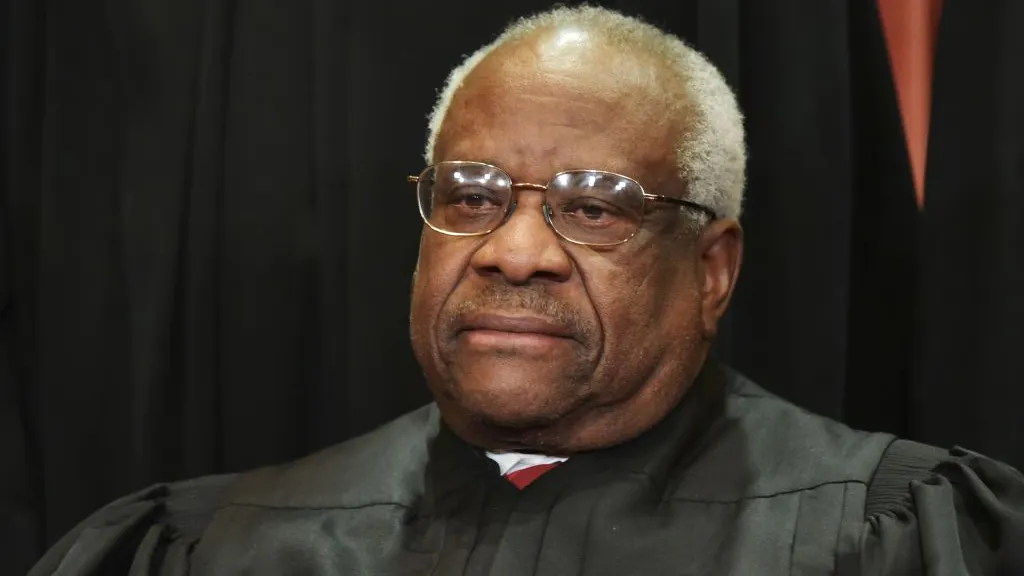On Thursday, in a concurring opinion he wrote agreeing with the Supreme Court’s 6-3 decision in Jones v. Mississippi, Justice Clarence Thomas smacked leftist justices on the Court for their hypocrisy when it came to the maturity of minors. Thomas pointed out that some language in Court decisions assumed that when referring to juvenile murderers, members of the Court had cited that “children are different” and that courts must consider “a child’s lesser culpability,” yet when discussing abortion by girls of minor age, leftist justices had assumed they were mature enough to make that decision.
Thomas wrote, “When addressing juvenile murderers, this Court has stated that ‘children are different’ and that courts must consider ‘a child’s lesser culpability.’” (Thomas was referring to Montgomery v. Louisiana.) “And yet, when assessing the Court-created right of an individual of the same age to seek an abortion, Members of this Court take pains to emphasize a ‘young woman’s’ right to choose.” (Thomas referred to Lambert v. Wicklund, Planned Parenthood of Southeastern Pa.v. Casey, and Ohio v. Akron Center for Reproductive Health.)
“It is curious how the Court’s view of the maturity of minors ebbs and flows depending on the issue,” he concluded.
The case in which Thomas offered his concurrence, Jones v. Mississippi, revolved around Brett Jones, who was 15 years old when he murdered his grandfather. At the time of his conviction, a murder conviction meant a mandatory sentence of life without parole in Mississippi. That sentence was pronounced by the trial judge; the decision was appealed.
Later, the Supreme Court decided Miller v. Alabama, which held that “the Eighth Amendment permits a life-without-parole sentence for a defendant who committed a homicide when he or she was under 18, but only if the sentence is not mandatory and the sentencer therefore has discretion to impose a lesser punishment,” as the Supreme Court stated.
The Mississippi Supreme Court cited Miller, ordering Jones to be re-sentenced. But the sentencing judge pointed out he had discretion under Miller to impose a sentence less than life without parole, and thus his sentencing was appropriate. Jones appealed again, citing another new case, Montgomery v. Louisiana, claiming that under Miller and Montgomery, a sentencer must make a separate factual finding that a murderer under 18 is permanently incorrigible before sentencing the offender to life without parole. That argument was rejected by the Mississippi Court of Appeals.
The Supreme Court ruled on Thursday, “In the case of a defendant who committed a homicide when he or she was under 18, Miller and Montgomery do not require the sentencer to make a separate factual finding of permanent incorrigibility before sentencing the defendant to life without parole. In such a case, a discretionary sentencing system is both constitutionally necessary and constitutionally sufficient.”
“Miller and Montgomery are from the same lineage of precedent that refashions the Eighth Amendment to accommodate this Court’s views of juvenile justice. The similarities end there, however, because the decisions cannot be reconciled,” Thomas asserted.
Thomas continued:
Rather than accept what was plainly the case—that Miller was procedural, not watershed, and thus not retroactive—Montgomery proceeded to “rewrite” it into a substantive rule. … Montgomery could not have been clearer that its rule transcended mere procedure: “Even if a court considers a child’s age before sentencing him or her to a lifetime in prison, that sentence still violates the Eighth Amendment for a child whose crime reflects ‘unfortunate yet transient immaturity.’”
“The problem with this new rule is that it had little to do with Miller,” Thomas opined. “Through a feat of legerdemain, Montgomery began by acknowledging that Miller did ‘not categorically bar a penalty for a class of offenders or type of crime,’ yet just three sentences later concluded that ‘Miller did bar life without parole . . . for all but the rarest of juvenile offenders, those whose crimes reflect permanent incorrigibility.’ In a similar Janus-faced demonstration, Montgomery reiterated Miller’s assurance that ‘trial courts [need not] make a finding of fact regarding a child’s incorrigibility,’ yet decided that ‘Miller drew a line between children whose crimes reflect transient immaturity and those rare children whose crimes reflect irreparable corruption.’ These statements cannot be reconciled.”

.png)
.png)
.png)

